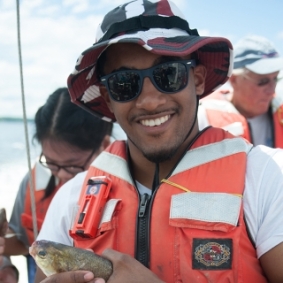Eight students will be presenting the summer work at the Ocean Sciences Meeting in March 2022!
Edwin Sanchez, Millersville University (PA)
Class Year:
2017Mentor:
Christopher Rowe, Ph.D.Project Title:
Evaluation of the Effects of Chronic Temperature Acclimation and Quality of Diet on Metabolic Rates, Larval Growth, and Development of Hyla chrysoscelis and Lithobates sphenocephalus
Abstract:
Because amphibian populations are already being threatened globally for a multitude of reasons, it is necessary to understand how increasing temperature resulting from climate change will impact these ectothermic species. Two anuran species of frog, Cope’s gray tree frogs (Hyla chrysoscelis, Family Hylidae) and southern leopard frogs (Lithobates sphenocephalus, Family Ranidae) were selected to determine the effects of chronically elevated temperatures and quality (protein content) of their diet on their metabolic rate, growth, and development. Metabolic rates of H. chrysoscelis were significantly impacted by diet quality at low temperatures (ANCOVA, p = p = 0.009), but were not significantly affected at higher temperatures. While not significant, in H. chrysoscelis anurans, those fed the high protein diet at low temperatures on average experienced a larger proportional change in weight than those fed the same treatment at 30°C. In H. chrysoscelis, there was no significant difference in developmental rates between individuals fed the high protein diet and those fed the low protein diet for a given temperature. Metabolic rates in L. sphenocephalus were significantly impacted by diet quality at low temperatures (ANCOVA, p = 0.032), but were not significantly affected at higher temperatures. Similar to the results of H. chrysoscelis, at both temperatures the frogs fed the high protein diet were insignificantly younger at the time of forelimb emergence (e.g. developed faster) that those fed a low protein diet. Lithobates sphenocephalus fed the high protein diet at low temperatures experienced an insignificantly larger proportional change in weight than those fed the high protein diet at the higher temperature.




